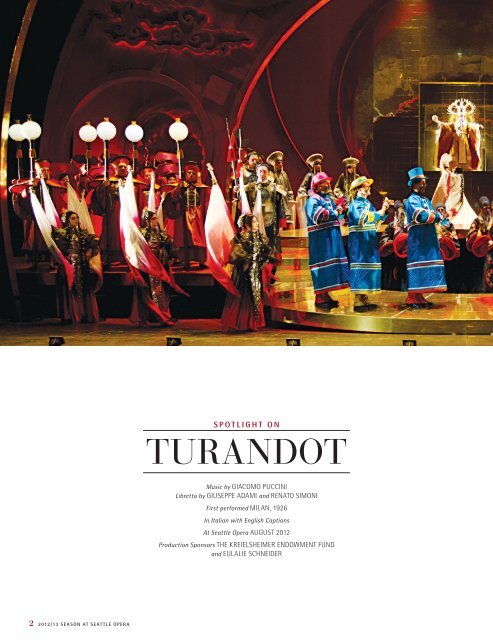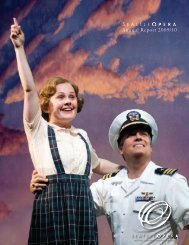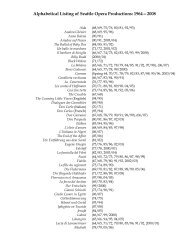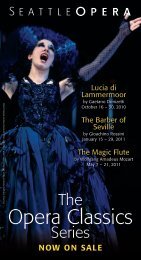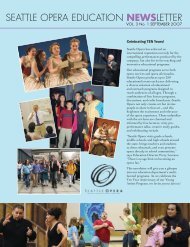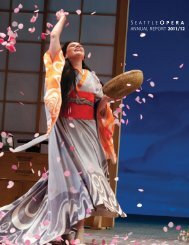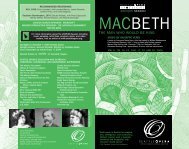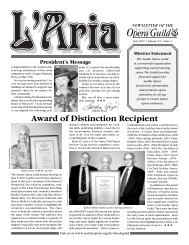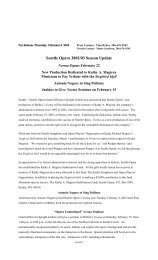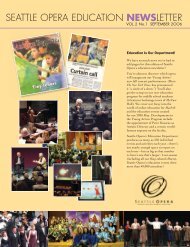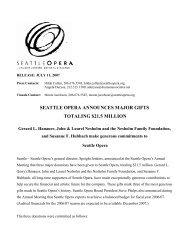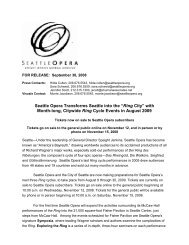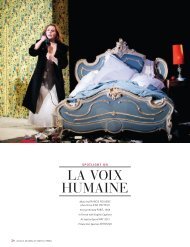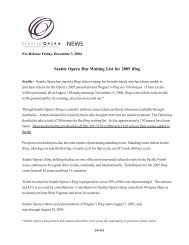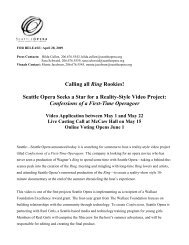Create successful ePaper yourself
Turn your PDF publications into a flip-book with our unique Google optimized e-Paper software.
2 2012/13 SeaSon at <strong>Seattle</strong> opera<br />
spotlight on<br />
<strong>TURANDOT</strong><br />
Music by Giacomo Puccini<br />
Libretto by GiusePPe adami and Renato simoni<br />
First performed milan, 1926<br />
In Italian with English Captions<br />
At <strong>Seattle</strong> <strong>Opera</strong> auGust 2012<br />
Production Sponsors the KReielsheimeR endowment Fund<br />
and eulalie schneideR
Long Story Short<br />
ice princess learns how to love.<br />
Who’S Who?<br />
TurandoT, the beautiful princess of china,<br />
decapitates any man who’s interested in her.<br />
The unknown Prince loves her so intensely<br />
he’s happy to risk his head. his name is “calaf”<br />
(but you aren’t supposed to know that yet).<br />
Timur, his father, is the old, blind, dethroned<br />
king of tartary.<br />
Liù, a meek slave girl, fell in love with the<br />
unknown Prince’s smile long ago. she is old<br />
timur’s faithful companion in exile.<br />
aLToum, turandot’s father, is the feeble, ancient<br />
emperor of china.<br />
Ping, Pang, and Pong are mandarins in turan-<br />
dot’s imperial bureacracy. their job is to attempt<br />
to slow down rash, lovesick young princes, but<br />
they aren’t very good at it.<br />
Where and When?<br />
the Forbidden city, in the days of legend.<br />
What’S going on?<br />
the Prince of Persia, like so many before him,<br />
has failed to answer turandot’s three riddles<br />
and will be beheaded at the rising of the moon.<br />
as the bloodthirsty crowd gleefully anticipates<br />
the execution, the unknown Prince bumps into<br />
his long-lost father, and the two share a tearful<br />
reunion. old timur introduces his son to liù, the<br />
gentle slave girl who has supported the old man<br />
ever since his kingdom was sacked. the Prince<br />
2012/13 SeaSon at <strong>Seattle</strong> opera 3<br />
Turandot, Pittsburgh <strong>Opera</strong>, 2011 (David Bachman photo)
asks her what inspired such devotion, and she<br />
responds, “once, you smiled at me.”<br />
at the rising of the moon, Princess turandot<br />
gives the signal for the execution of the Prince<br />
of Persia. totally mesmerized by a single glimpse<br />
of her, the unknown Prince rushes to strike the<br />
sacred gong and announce himself as turandot’s<br />
next suitor. But turandot’s ministers, Ping, Pang,<br />
and Pong, burst out of the palace and try to<br />
block his path, to scare him off, to reason with<br />
him—but to no avail. liù and timur also plead<br />
with the Prince not to risk his life, but he breaks<br />
free from all of them, strikes the fatal gong three<br />
times, and declares himself ready for the test.<br />
Before the trial, turandot explains that she had<br />
a beautiful, chaste, and wise ancestor, Princess<br />
lou-ling, whose kingdom was overrun. lou-ling<br />
was raped and murdered, and turandot will<br />
forever avenge her death upon all men. she asks<br />
the Prince her three riddles—and he answers<br />
them all.<br />
the people salute turandot’s conqueror, but<br />
turandot implores her father not to give her<br />
away like a slave. the Prince, who wants only<br />
her love, proposes a riddle of his own: if she can<br />
tell him his name before dawn, he will forfeit his<br />
life. turandot’s stormtroopers immediately start<br />
ransacking the city, seeking the Prince’s name,<br />
slaughtering anyone who cannot help them. they<br />
are about to torture timur when liù cries out<br />
that she alone knows the<br />
name. she remains silent<br />
as they torture her, and<br />
turandot asks her the<br />
source of her strength.<br />
“Princess, it is love,” says<br />
liù. she describes her<br />
love for the Prince and<br />
prophesies that before<br />
dawn, turandot will love<br />
him too. then she grabs<br />
a dagger from a nearby<br />
guard and kills herself.<br />
turandot and the unknown<br />
Prince are arguing<br />
about what has happened<br />
when suddenly<br />
they kiss. he is amazed<br />
to see her first tears.<br />
4 2012/13 SeaSon at <strong>Seattle</strong> opera<br />
she asks him to leave and take the secret of his<br />
name with him, but at dawn he tells her who he<br />
is. they appear before the emperor again, and<br />
turandot tells her father she has discovered the<br />
stranger’s name: “it is love.”<br />
gozzi’S TurandoTTe<br />
Turandot is based on a play by one of Venice’s<br />
most illustrious sons, carlo Gozzi, whose stylistically<br />
unique plays commemorate the fall of a<br />
once-mighty empire: the most serene Republic<br />
of Venice.<br />
Born in 1720, Gozzi came from an old Venetian<br />
family that had fallen on hard times. he was<br />
staunchly conservative, an enemy of all things<br />
modern, including the enlightenment, and,<br />
in the theater, the realistic kind of situation<br />
comedy developed by another great eighteenthcentury<br />
Venetian playwright, carlo Goldoni.<br />
determined to bring back the good old days of<br />
italian theater, Gozzi developed a kind of play<br />
he called the fiabe, or fable. most of these plays<br />
take place in an oriental fantasy world along<br />
the lines of the arabian nights; the plots work<br />
like fairy tales, and there’s always a role for the<br />
traditional clowns of commedia dell’arte. Gozzi’s<br />
works are odd mixtures of witchcraft and sorcery<br />
in far-off lands with the kind of improvised<br />
carnival buffoonery that had been the stuff of<br />
italian theater for centuries. Turandotte, Gozzi’s<br />
best-known play, finds the man-hating Princess<br />
of ancient china employing four Venetian<br />
nincompoops as her ministers-of-state. (Gozzi’s<br />
Pantalone, tartaglia, Brighella, and truffaldino<br />
become Puccini’s Ping, Pang, and Pong.) Turandotte<br />
was so popular that there already existed<br />
eight other operas based on the play before<br />
Puccini sat down to write his version.<br />
the MuSic of TurandoT<br />
when Giacomo Puccini came onto the scene in<br />
the 1890s, italian opera had reached a crossroads.<br />
For hundreds of years, operas had been<br />
constructed by stringing together lots of independent<br />
musical pieces and connecting the<br />
musical highlights with quasi-musical dialogue<br />
that advanced the plot. You were always getting<br />
either story or music, never both at the same time.<br />
But over the second half of the nineteenth century,<br />
two opera composers—the German Richard<br />
wagner and the italian Giuseppe Verdi—changed<br />
all that, inventing a new kind of opera where<br />
the music and the drama are one and unfold<br />
simultaneously. in the italian tradition, Puccini<br />
picked up where Verdi left off. and he learned a<br />
great deal from wagner as well. Turandot, Puccini’s<br />
final opera, is musically a summation of his<br />
entire career. all the reasons people love Puccini’s<br />
operas are packed into this one score.<br />
A performance of Verdi’s aida changed Puccini’s life when he was a teenager and made him want to be an<br />
opera composer. turandot, his final masterpiece, shares aida’s barbaric splendor and compelling love triangle.<br />
<strong>Seattle</strong> <strong>Opera</strong>, Aida, 2008 (Rozarii Lynch photo)
Ping, Pang, and Pong sing some of the most beautiful music Puccini ever wrote.<br />
exoTic grandeur. when he was a teenager,<br />
Puccini famously walked almost 40 miles to<br />
attend a performance of Verdi’s Aida, the<br />
first italian opera to attempt an authentic<br />
musical representation of an exotic location.<br />
Turandot goes even further than Aida in terms<br />
of presenting a grandiose spectacle, the italian<br />
answer to what was known as “French Grand<br />
opera.” not only is it set in a fabulous, faraway<br />
world of barbaric antique splendor, bold warriors,<br />
sly priests, cruel princesses, and suffering slaves,<br />
Turandot features authentic foreign music.<br />
unlike Verdi, who made up an “ancient egyptian”<br />
scale out of thin air, Puccini actually researched<br />
chinese music—and more diligently than he had<br />
Japanese music when he composed Madama<br />
Butterfly 20 years previously. he added bells,<br />
gong, tam-tam, glockenspiel, xylophone (plus<br />
bass xylophone, newly invented for this opera)<br />
to his standard western percussion section,<br />
and quotes eight traditional chinese tunes. For<br />
example, one famous folk song, “mo li hua”<br />
(Jasmine Flower), becomes a recurring motif<br />
attached to the character of turandot.<br />
TheaTricaLiTy and breviTy. elaborate<br />
grand operas from the nineteenth century are<br />
rarely given nowadays, because modern theaters<br />
have a hard time justifying the enormous<br />
resources they demand. But grand operas like<br />
Turandot continue to hold the stage, partly<br />
because they’re quite a bit shorter (Turandot is<br />
about half as long as your average nineteenthcentury<br />
French grand opera), and partly because<br />
they’re conceived for modern theatrical tastes.<br />
Puccini had an unfailing instinct for what makes<br />
exciting theater. his operas are suspenseful<br />
and involving, with nothing extraneous, and he<br />
always knew when to leaven tragedy with a bit<br />
of humor.<br />
modern harmony. traditional western<br />
harmony was breaking up by the time Puccini<br />
began his career, and his score for Turandot,<br />
although overwhelmingly tonal, employed all<br />
the latest harmonic techniques. listen for<br />
bitonality—what happens when two nearby key<br />
areas are set up at the same time—whenever the<br />
curtain goes up; this jarring sound indicates that<br />
something is very wrong in the accursed china of<br />
Princess turandot. Puccini also uses the special<br />
whole-tone scale, with its prominent tritone, the<br />
forbidden diabolus in musica, to characterize the<br />
bloodthirsty Princess, her sadistic servants, and<br />
the ghosts of all those who gave their lives for<br />
her sake. and, appropriately for an opera set in<br />
the east, Puccini makes much use of pentatonic<br />
music. many eastern musical traditions rely<br />
on the pentatonic, or five-note scale (instead<br />
of the eight-note diatonic scale of western<br />
Turandot, Pittsburgh <strong>Opera</strong>, 2011 (David Bachman photo)<br />
AriA reAdy?<br />
lori phillipS, turandot<br />
“in questa reggia”<br />
Turandot explains the origins of her<br />
vendetta against men.<br />
So: Why is this an important moment<br />
for your character?<br />
lP: turandot tells calaf that thousands<br />
of years ago, in this same kingdom,<br />
her ancestor, Princess lou-ling, cried<br />
out—and that cry has taken refuge in<br />
turandot’s soul.<br />
So: does Turandot always explain<br />
herself this way, each time a prince<br />
undertakes her riddle test?<br />
lP: Yes, i think that turandot explains herself<br />
this way each time and, furthermore,<br />
that she is disappointed each time the<br />
suitor chooses to ignore her story.<br />
So: Which emotions does Turandot feel<br />
when she sings this aria?<br />
lP: turandot appears to be strong and<br />
confident, but she is really experiencing<br />
intense fear and deep sadness.<br />
So: If you could advise an operagoer to<br />
listen for one thing during this aria,<br />
what would that one thing be?<br />
lP: try to listen to the regal quality of it—the<br />
beautiful serenity at the beginning that<br />
builds to a more intense, declamatory<br />
conclusion.<br />
So: Why do you love this aria?<br />
lP: i love the way Puccini built “in questa<br />
reggia.” he starts it securely, serenely,<br />
with consistent, lyrical lines and leads<br />
the soprano into intense leaps (middle<br />
c#s to high as) in the middle and<br />
through to the end of the aria, culminating<br />
in a dueling high c with calaf.<br />
Nashville <strong>Opera</strong>, 2006 (Marianne Leach photo)<br />
2012/13 SeaSon at <strong>Seattle</strong> opera 5
music). make up a tune at a piano using only<br />
the five black keys, and you’ll hear its charac-<br />
teristic sound. in Turandot, Puccini’s pentatonic<br />
tunes—both the ones he created and the ones he<br />
quoted—underscore the opera’s asian setting.<br />
unforgeTTabLe arias. Puccini understood<br />
from long experience that an opera succeeds<br />
when its characters have great arias to sing, and<br />
he duly composed magnificent opportunities<br />
for the singers playing liù, the unknown Prince,<br />
and turandot to wow the audience with their<br />
beautiful voices and their characters’ passions.<br />
For more on turandot’s famous entrance aria, “in<br />
questa reggia,” see page 11. liù’s beautiful arias<br />
(“signore, ascolta” in act i and the double aria<br />
of her death scene) are so sincere and heartfelt<br />
she generally makes it difficult for turandot to<br />
win back the audience’s sympathies. and, ever<br />
since luciano Pavarotti chose it as his signature,<br />
the Prince’s act iii serenade “nessun dorma” has<br />
become one of the world’s most cherished pieces<br />
of music. You hear it at soccer matches and arena<br />
and rock concerts in addition to opera houses.<br />
wisTfuL nosTaLgia. although he could<br />
write music for every possible emotion, Puccini<br />
excelled at depicting a certain familiar, gentle,<br />
homesick yearning, particularly as voiced by his<br />
male characters. the tenor-baritone duets in La<br />
bohème and Madama Butterfly, cavaradossi’s<br />
tearful “e lucevan le stelle” from Tosca, the sad<br />
folk songs of the miners in La fanciulla del West,<br />
6 2012/13 SeaSon at <strong>Seattle</strong> opera<br />
Turandot, Pittsburgh <strong>Opera</strong>, 2011 (David Bachman photo)<br />
Above: In her aria “Del primo pianto,” composed by Franco Alfano, Turandot weeps for the first time in her life.<br />
Below: Old Timur laments the death of Liù, who has been his faithful companion ever since the fall of his<br />
kingdom.<br />
and michele’s overwhelming cry of “why don’t<br />
you love me anymore?” in Il tabarro—these are<br />
some of his greatest, most moving achievements,<br />
and in every case they’re a musical lament for a<br />
blissful happiness that’s no longer available. in<br />
Turandot, you’ll hear this sound when the trio of<br />
ministers sigh for the peaceful country life each<br />
has forfeited in order to play their role in turandot’s<br />
psychotic court.<br />
the PoSthuMouS PreMiere<br />
of TurandoT<br />
seattle opera celebrates one of the greatest<br />
italian composers this season by presenting<br />
three extremely different operas from different<br />
points of his career. over the course of his life,<br />
the transformations in Puccini’s art followed the<br />
multitudinous changes taking place in the world<br />
around him.<br />
Puccini was only 62 years old when he began<br />
writing Turandot, but he felt like an old man.<br />
the world had changed as a result of world<br />
war i; an entire generation of young men had<br />
been decimated, and the old world was falling<br />
Nashville <strong>Opera</strong>, 2006 (Marianne Leach photo)<br />
apart. Puccini sensed that Turandot would be his<br />
swan song, and he wanted to create an opera<br />
that would be both modern and popular, an<br />
exhilarating spectacle both fantastic and deeply<br />
human. he set to work with two inspired young<br />
librettists, Giuseppe adami and Renato simoni.<br />
But Turandot did not come easily; far from it.<br />
Puccini and his collaborators wrote and rewrote,<br />
changed the number of acts, added characters<br />
and deleted them, and were often on the<br />
verge of giving up in despair. Puccini worked on<br />
Turandot longer than he had on any other opera,<br />
and still he was unable to finish it. the duet for<br />
turandot and the unknown Prince, following the<br />
suicide of liù, caused him the most trouble. how<br />
was the prince supposed to melt the heart of the<br />
bloodthirsty princess and turn her into a decent<br />
and sympathetic human being?<br />
as Puccini struggled with the ending of Turandot<br />
he began to complain of a persistent sore throat.<br />
specialist after specialist was called in: the<br />
diagnosis was advanced throat cancer (Puccini<br />
was a heavy smoker). the composer was sent to a<br />
clinic in Belgium, where he underwent radiation<br />
therapy. seven crystals of radium were injected<br />
into his throat, killing his tumor. unfortunately,<br />
the radium also weakened Puccini’s heart, and<br />
he died shortly after the operation.
Puccini had asked the great conductor arturo toscanini to see Turandot to<br />
the stage. toscanini hired a composer named Franco alfano to complete<br />
the duet for turandot and the Prince. working from Puccini’s notes,<br />
alfano wrote the conclusion to the opera that is generally played when<br />
turandot is performed today. the first performance took place five months<br />
after Puccini died. it was quite a night for toscanini; first he got into a<br />
fight with Benito mussolini and had him evicted from the opera house.<br />
(mussolini had wanted toscanini to begin the evening by playing “Giovi-<br />
TurandoT:<br />
lori phillipS<br />
Soprano (Providence, RI)<br />
Recently at <strong>Seattle</strong> <strong>Opera</strong>:<br />
Amelia, Un ballo in<br />
maschera (‘02)<br />
a thrilling dramatic<br />
soprano with several<br />
sentas and turandots<br />
in her background, lori sings this difficult<br />
role easily and with real beauty.<br />
Marcy StonikaS<br />
Soprano (Elmhurst, IL)<br />
Former <strong>Seattle</strong> <strong>Opera</strong> Young<br />
Artist<br />
Recently at <strong>Seattle</strong> <strong>Opera</strong>:<br />
Second Lady, The Magic<br />
Flute (’11)<br />
no one can question<br />
the size or power of marcy’s voice. in audition,<br />
turandot sounds easy for her; it’s time<br />
that she do one onstage.<br />
caLaf:<br />
antonello paloMbi<br />
Tenor (Spoleto, Italy)<br />
Recently at <strong>Seattle</strong> <strong>Opera</strong>:<br />
Foresto, Attila (’12)<br />
to my mind one of<br />
the few true italian<br />
dramatic tenors in the<br />
world who combines<br />
power and thrust with a superb legato and<br />
great taste. his triumphs in five previous<br />
roles at seattle opera make him obvious for<br />
calaf.<br />
luiS chapa<br />
Tenor (Monclova, Mexico)<br />
Recently at <strong>Seattle</strong> <strong>Opera</strong>:<br />
Don José, Carmen (’11)<br />
his don José during<br />
the 2011/12 season was<br />
strong; calaf is a role<br />
that this fine mexican<br />
tenor has sung many times before with great<br />
success.<br />
Speight JenkinS introduceS<br />
The ArTisTs of Turandot<br />
Liù:<br />
lina tetriani<br />
Soprano (Tbilisi, Georgia)<br />
<strong>Seattle</strong> <strong>Opera</strong> debut<br />
Grazia doronzio<br />
Soprano (Stigliano, Italy)<br />
<strong>Seattle</strong> <strong>Opera</strong> debut<br />
i had the good fortune to hear both sopranos<br />
audition at about the same time. Both displayed<br />
warmth, melting high notes, and<br />
superb legato. Both are young and attractive. i<br />
decided on the spot to have each perform four<br />
of our liùs. i think each will be a huge asset to<br />
seattle opera.<br />
Timur:<br />
peter roSe<br />
Bass (Canterbury, UK)<br />
Recently at <strong>Seattle</strong> <strong>Opera</strong>:<br />
Falstaff, Falstaff (’10)<br />
one of the great basses<br />
of our time, Peter will add<br />
an amazing and rich color<br />
and quality to the role of<br />
calaf’s father, timur.<br />
Ping:<br />
patrick carfizzi<br />
Bass-Baritone (Newburgh, NY)<br />
Recently at <strong>Seattle</strong> <strong>Opera</strong>: Dr.<br />
Bartolo, The Barber of Seville<br />
(’11)<br />
a funny Bartolo and a<br />
superb nourabad in The<br />
Pearl Fishers, Patrick will<br />
take on a role that might seem less than those<br />
he has sung before. it, however, has been the<br />
nezza,” the Fascist anthem; toscanini told him “la scala is not a beer hall!”)<br />
and then toscanini stopped the performance immediately before the love<br />
duet. he turned to the audience and said, in a choked voice, “the opera is<br />
incomplete. it ends here, because at this point the maestro died.” there was<br />
a moment of silence before the audience leaped to their feet and cheered<br />
the fallen Puccini for half an hour. Puccini was the last great composer in<br />
what has been called the “Golden century” of italian opera, and Turandot<br />
was the last italian opera to achieve worldwide popularity.<br />
preserve of great baritones, including theodor<br />
uppman and Giuseppe de luca.<br />
conducTor<br />
aSher fiSch<br />
(Jersusalem, Israel)<br />
Recently at <strong>Seattle</strong> <strong>Opera</strong>:<br />
Tristan und Isolde (’11)<br />
our principal guest conductor<br />
and a favorite at<br />
dresden and the Bavarian<br />
state opera in munich,<br />
asher has previously only conducted wagner<br />
and Richard strauss in seattle, but his experience<br />
includes the whole repertory, and it will<br />
be exciting to hear his Puccini.<br />
design Team<br />
renaud doucet<br />
Stage Director<br />
(Cannes, France)<br />
<strong>Seattle</strong> <strong>Opera</strong> debut<br />
andré barbe<br />
Set and Costume Designer<br />
(Montreal, Canada)<br />
<strong>Seattle</strong> <strong>Opera</strong> debut<br />
Guy SiMard<br />
Lighting Designer<br />
(Montreal, Canada)<br />
Previously at <strong>Seattle</strong> <strong>Opera</strong>:<br />
Faust (’98)<br />
the first time at seattle opera for this design<br />
team, they are now working together all over<br />
the world. the photographs of this Turandot<br />
are very exciting.<br />
2012/13 SeaSon at <strong>Seattle</strong> opera 7


